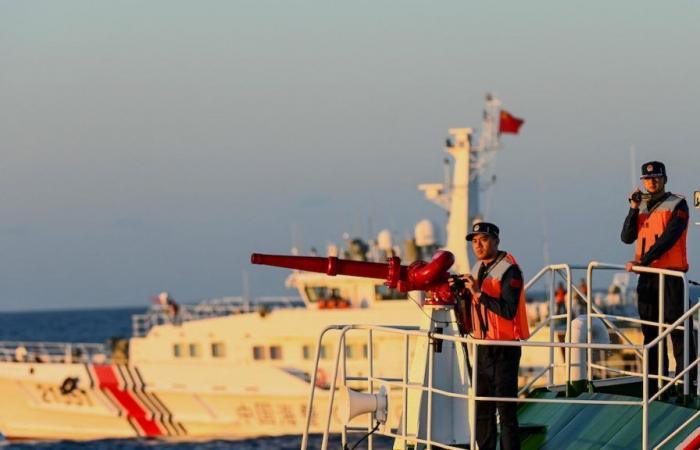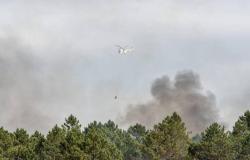Clashes at sea with Japan, Taiwan and the Philippines and imposition of the death penalty on Taiwanese “independenceists”. China has recently been demonstrating its hegemonic power more aggressively, which worries many in the international community.
Last week, four coast guard vessels chased Chinese fishing boats out of territorial waters disputed by China and Japan.
The Japanese coast guard, for its part, said it had to intervene and push back the Chinese ships near the disputed islands named Senkaku in Japan and Diaoyu in China.
For weeks, the coast guard has been conducting control operations in the Taiwan Strait near the Taiwanese archipelago Kinmen. Maneuvers that are disturbing to the point that Taipei dispatched three ships of its coast guard this week to monitor and document Chinese activities.
Clashes between the Chinese coast guard and Philippine ships in waters contested by China have also been frequent for months.
Images of Chinese coast guards brandishing axes to frighten their Filipino counterparts went around the world last week.
Open in full screen mode
In this photo provided to the Associated Press by the Philippine Armed Forces, a Chinese coast guard cutter swings an ax as they approach Philippine troops on a resupply mission in the Second Thomas Shoal in the disputed South China Sea. on June 17, 2024. (Archive photo)
Photo : AP
This latest dispute at sea with the Philippines came just two days after a new Chinese law took effect authorizing the Chinese coast guard to arrest foreign vessels and detain members of its coast guard for 60 days without trial. crew in the South China Sea.
China has engaged in aggressive shipbuilding and coast guard capacity building programs. It is also building a lot of infrastructure, such as artificial islands in the South China Sea, to increase its ability to project power into its neighbors’ internal waters.
recently told Voice of America (VOA) Ray Powell, director of Gordian Knot Center from Stanford University.
Canadian satellites and US naval unit to counter Chinese aggression
Canada has put its satellite technology to work for Manila to detect intrusions into its territorial waters. The Philippines says it has used it over the past 10 days to monitor a coast guard vessel nicknamed The Monster.
Canada’s Dark Vessel Detection Program was launched in 2021. It uses satellite technology to locate and track vessels whose location transmitting devices have been turned off, sometimes in an attempt to evade tracking, control and surveillance.
This programme was initially established to provide satellite data and analysis to small island and coastal states around the world where illegal, unreported and unregulated fishing has major impacts on local economies, food security and the health of fish stocks.
Open in full screen mode
Philippine soldiers watch as a Javelin missile hits a target at sea during a counter-landing live-fire exercise as part of the U.S.-Philippines joint military exercises May 6, 2024, in Laoag, Philippines.
Photo : Getty Images / Ezra Acayan
Canada supports the Philippines and the decision of an international court ruling in its favor in its maritime dispute with China. Both countries recently participated in military exercises with the United States.
In January last year, Ottawa and Manila signed a defense agreement as part of Canada’s Indo-Pacific Strategy.
Canadian vessels operate in the North Pacific under this Strategy. A first mission to counter illegal fishing with the help of satellite detection took place in 2023.
Last fall, 250 members of the Canadian Forces participated in Operation Neon at sea and in the air to help monitor illegal activities in this region.
The Canadian presence in Asia has grown since the unveiling of the Canadian Indo-Pacific Strategy.
Dangerous operations by the Chinese coast guard and navy are so frequent that Washington has also reorganized its forces in Asia and created a new naval unit last November based on the Japanese island of Okinawa, near Taiwan.
The named entity Coastal Marine Regiment
is tasked with defending important geopolitical locations in Asia and countering what the Americans see as Chinese aggressiveness.
The U.S. unit also vows to intervene quickly if remote islands claimed by China come under attack.
It is designed to detect distant activity and carry out long-range fire, using mobile missile batteries capable of striking enemy ships in strategic maritime lines of communication. The goal is to protect the Japanese islands, the Philippines and South Korea
said U.S. Navy Commander Gen. Eric Smith in a rare interview with Nikkei Asia on June 21 in Washington.
De-escalation remains the preferred resolution for everyone. For example, Manila is trying to hold discussions with Beijing regarding the clashes at sea near the Second Thomas Reef. This call could ultimately take place in the coming weeks.
We tried all sorts of ways to lower the tension level. Clearly, most of these measures have not worked and so we believe that a frank discussion with the Chinese is probably the best way forward
Philippine Ambassador to Washington Jose Manuel Romualdez told a group of reporters.
The World War II-era Sierra Madre ship stranded near Second Thomas Reef is at the heart of tensions between China and the Philippines.
Open in full screen mode
A Chinese coast guard ship passes the beached Philippine navy ship BRP Sierra Madre, where troops are stationed to assert Manila’s territorial claims in the disputed South China Sea. (Archive photo)
Photo : afp via getty images / TED ALJIBE
Manila uses the ship in its territorial waters as a naval base and the coast guard carries out frequent resupply missions.
Despite an international judgment against it in 2016, China considers these to be its territorial waters.
Recent clashes between Chinese and Philippine coast guards threaten to spark an armed conflict that would also draw the United States into. Washington and Manila signed peace agreements last year Guidelines for bilateral defense
.
According to the document, an armed attack on a Philippine ship would trigger an obligation for the Americans to intervene and defend the territory.
China wants to impose the death penalty on independentists
from Taiwan
A new judicial recommendation issued by the Chinese Communist Party came into effect on June 21 to further pressure and intimidate Taiwan.
These guidelines promise life imprisonment or the death penalty for independentists
Taiwanese guilty of the crime of secession.
According to Chinese state media, this is a direct response to the inauguration speech of Taiwan’s new president, Lai Ching-te. The rules are said to target Taiwan’s ruling party.
The Taiwanese president said in his speech on May 20 that Taiwan and China are not subordinate to each other.
China has no right to punish Taiwanese people for their political views or to prosecute them beyond its borders. Democracy is not a crime; autocracy is what is truly evil. Once again, I urge China to choose dialogue with Taiwan’s democratically elected government.
replied Lai Ching-te on his X account.
Open in full screen mode
Taiwanese President Lai Ching-te is seen by Beijing as a promoter of “separatist activities linked to independence”. (Archive photo)
Photo : Getty Images / Annabelle Chih
The Taiwanese president said he was worried about the new Chinese rule last Wednesday. He noted that it could potentially affect more than 90 percent of Taiwan’s population.
The new guidelines also state that people “in the fields of education, culture, history and media who distort and falsify the reality that Taiwan is part of China” also fall under the guidelines. This could be aimed at silencing media outlets, academics and commentators, similar to how previous sanctions have expanded to target media figures and not just politicians.
commented Brian Hioe, the founder of the magazine New Bloomin his publication.
The Chinese Communist Party has never ruled or owned the island of Taiwan, but it still considers it part of its territory.
The self-governing democratic island issued a warning this week, advising its 24 million citizens to avoid travel to China, Macau and Hong Kong.
Beijing would force its allies to publicly reject Taiwan’s autonomy
Open in full screen mode
Chinese and Malaysian Prime Ministers Li Qiang and Anwar Ibrahim in Putrajaya, Malaysia, June 19, 2024.
Photo : AP
At the end of his meeting with the Chinese Prime Minister, Li Qiang, whom he received in Kuala Lumpur, the Prime Minister of Malaysia, Anwar Ibrahim, issued a press release which raised eyebrows.
In accordance with the one-China policy, Malaysia recognizes that Taiwan is an inalienable territory of the People’s Republic of China.
it can be read. The statement also supports China so that it achieve national unification
.
Malaysia joins a group of countries that are no longer content to stress their support for the one-China principle, but are also adding their explicit support for the takeover of the democratic island of Taiwan.
Egypt, Tunisia, Pakistan, Zambia, East Timor and Bahrain have all changed their positions since last year to publicly express their support for the efforts unification of China
.
American analysts believe that Beijing is increasingly forcing its allies to speak out publicly on this issue in response to the U.S.-led bloc, of which Canada is a member, which constantly repeats that it seeks peace and stability in the Taiwan Strait.
Beijing is no longer content to discourage Taiwanese independence. Xi Jinping is now seeking to promote unification
Bonnie Glaser, the managing director of the Indo-Pacific program at Nikkei Asia, told Nikkei Asia. German Marshall Fund of the United States.
China denies responsibility and maintains that the United States is responsible for tensions and clashes in Asia because of its support for Taiwan and the Philippines.






